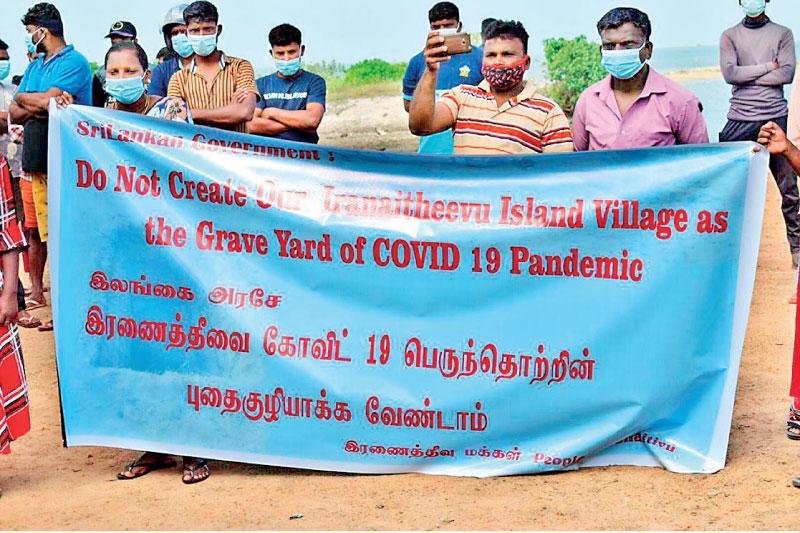Reply To:
Name - Reply Comment

 On December 8, 2023, the Human Rights Commission of Sri Lanka (HRCSL) determined that the Navy had violated my right to freedom of movement by blocking me from travelling to the remote Iranaitheevu island in Kilinochchi district on March 5, 2021. The HRCSL had recommended the Navy not to impose any restriction on Sri Lankan citizens to enter Iranaitheevu, including requesting prior authorisation or notice, unless the restrictions are by law. The HRCSL had also asked the Navy Commander to issue clear instructions to this effect in the form of a circular to officers stationed in the North Central Naval area.
On December 8, 2023, the Human Rights Commission of Sri Lanka (HRCSL) determined that the Navy had violated my right to freedom of movement by blocking me from travelling to the remote Iranaitheevu island in Kilinochchi district on March 5, 2021. The HRCSL had recommended the Navy not to impose any restriction on Sri Lankan citizens to enter Iranaitheevu, including requesting prior authorisation or notice, unless the restrictions are by law. The HRCSL had also asked the Navy Commander to issue clear instructions to this effect in the form of a circular to officers stationed in the North Central Naval area.
The HRCSL had recognised that freedom of movement is guaranteed under article 14 (1) (h) of the Sri Lankan constitution and article 12 of the International Covenant on Civil and Political Rights, to which Sri Lanka is a party. The HRCSL had also referred to the historic Supreme Court judgement (SC FR 44/2002) determining that freedom of movement can only be restricted by law, as per article 15 (7) of the constitution. The HRCSL also made reference the United Nations Human Rights Committee’s General Comment 27 which also recognises any restrictions on freedom of movement must be by law.
Given the possibility of future similar infringements of freedom of movement of citizens on travelling to Iranaitheevu, the HRCSL had decided my complaint should not be referred to conciliation or mediation and that certain recommendations had to be made to the Navy.
Considering the regularity of arbitrary restrictions imposed by the Navy on persons travelling to Iranaitheevu, this is a significant determination and recommendation, but it could have been better, as I will point out later in this article.
Background
On 5th March 2021, two journalists and I were prevented by the Navy from travelling to Iranaitheevu. We had rented a van and undertaken a long overnight journey from Colombo to Mulankavil, from where we had arranged to rent a boat from the local fisher folk to travel to Iranaitheevu island. Community leaders in Iranaitheevu, including the Parish Priest, were awaiting us. I had planned to join a meeting and protest by the residents of the island that day. I also wanted to write an article about socio – political – economic situation on the island and visit the historical Catholic Church on the island; which I had done on previous visits to the island. But due to the arbitrary restrictions imposed by the Navy, I could not do any of this.
The (then) official spokesperson of the Navy had told “The Morning” newspaper and “MediaLK” website on the same day of the incident that Navy doesn’t allow anyone other than residents to go to the island. Eleven days later, on 16th March 2021, the same Navy spokesperson had told the “Daily Mirror” newspaper that “anyone who wishes to go to Iranaitheevu is allowed to enter the island now.” The use of the word “now” implies at least some people were not allowed to go earlier. When asked whether any legal document was produced to restrict movement (other than islanders) on March 5th, he had said the Navy had commenced an inquiry and would investigate the matter seriously. But no results of the inquiry (if any) have been shared with me or the HRCSL, including in the Navy’s written submission to the HRCSL.
According to a report, published in the Daily Mirror newspaper by a journalist who was with me and prevented from travelling to Iranaitheevu, “The Navy personnel at the Iranaimathanagar point said that they have been informed by the Thalaimannar Commander not to allow anyone other than islanders to enter the island.” An official at the District Secretariat has stated that “if you give prior notice, they (Navy) will allow entry. As a government body we have not imposed any restrictions, but the restrictions are for certain people based on illegal activities.” This implies that the Navy has restrictions on “certain people” going to Iranaitheevu Island or that they will only allow people to go if they give prior notice.
One islander, an eyewitness to the incident, was quoted as saying “Why can’t they allow you to go? You are here to find out people’s issues and stand by them. If you are not allowed, the protests our people do (on the island) would be in vain. Thus, the responsible authorities will not be aware of this burning issue. I think there is greater influence from the top government official. Any news pertaining to this issue should be allowed to be published. As people of Iranaimathanagar we are not against the media entering the island. We need the support of the media to bring this issue to the spotlight.”
Restrictions on travelling to Iranaitheevu
There have been regular incidents associated with the Navy unlawfully preventing persons from travelling to Iranaitheevu Island. The Daily Mirror report of March 16 quoted an islander as saying “Though we had boat passes yesterday we were not allowed to go to the island as our names were not in the list. Even people who are born in Iranaithivu but are not in the list were not allowed to enter”. On 5th March 2021, several other people (who were not with me) were also not allowed to travel to Iranaitheevu Island.
The Navy tried to prevent me and a group from travelling to Iranaitheevu Island on January 9, 2019 and we were only allowed to travel after the intervention of the HRCSL. Another person was prevented from travelling in December 2018, about which a complaint had been made to the HRCSL; this has been referred to in a reply to a tweet from the HRCSL. Yet another person was prevented from travelling to Iranaitheevu Island on January 6, 2019, which I had mentioned in an email to HRCSL on the same day.
On October1, 2023, Elke Scholiers, a foreign photojournalist and filmmaker visited Iranaitheevu and tweeted, “The navy and Ministry of Defence at Mulangavil is restricting my movement as a photojournalist to visit the Island Iranaithivu. Obtained documentation to access island and legally work in Sri Lanka. The navy also advised me to not tweet.” She later tweeted that she was able to reach Iranaitheevu Island after 6 hours of negotiations with Navy officials and with the help of the Ministry of Home Affairs and HRCSL, after making about 50 calls and sending around 15 emails in 6 hours.
Limitations of the HRCSL’s response
A complaint was made to the HRCSL as soon as the journalists and I were barred from travelling to Iranaitheevu on the morning March 5, 2021. The coordinator of the HRCSL’s Jaffna branch acted swiftly, making several interventions with the Navy, to allow us to travel and prevent imminent violations. He also kept me informed of his efforts. But his efforts and our own efforts to negotiate with officers of the Navy on site were not successful. Hence, the HRCSL had examined the complaint, considering submissions from me, the Navy, and the District Secretary as well as available evidence, which had led to the significant determination and recommendations on December 8, 2023.
But the HRCSL had failed to declare violations of my other rights, as consequence of violation of the right to freedom of movement, despite these being specifically pointed out. They include;
i. Freedom of speech, expression, and publication – article 15 (1) (a) of the constitution – I could not write and publish the intended article about the situation in Iranaitheevu island, as I had done in my previous visits to the island.
ii. Freedom of assembly – article 15 (1) (b) of the constitution - I was prevented from joining the protest that was happening in the island and from joining a meeting with the residents organized by the Parish Priest and community leaders.
iii. Freedom of religion or belief – article 10, article 14 (1) (e) of the constitution – I was prevented from praying and worshipping in the Catholic church, which I had done in all previous visits to the island.
iv. Right to equality and non-discrimination – article 12 (2) and article 12 (3) of the constitution – by preventing me from travelling to the island and allowing residents to travel, I was discriminated based on the area of residency.
The HRCSL is familiar with the above-mentioned incident in October 2023, when a foreign journalist with relevant documentation was obstructed from travelling to Iranaitheevu. Despite this and my request for recommendations to cover “anyone”, the recommendation is limited to “Sri Lankan citizens”. I requested the recommendations to include “any public place in Sri Lanka”, but the HRCSL recommendations only covered Iranaitheevu. Even last month, I had complained to the Police and the HRCSL of the police unlawfully stopping me, and four other journalists, from accessing Mayilthmadhu to meet some farmers, in the Eastern province.
The HRCSL had also rejected my requests to recommend that the Navy acknowledges the violations and submits a written apology to me, reimburse costs incurred by me in travelling towards Iranaitheevu and pay me reasonable costs as compensation for violating my rights. I had also asked the HRCSL to award me a reasonable sum of money that in HRCSL’s opinion is sufficient to meet the expenses, that have been reasonably incurred by me in making this complaint to the HRCSL, as per article 11 (g) of the HRCSL Act, but the HRCSL had also failed to do so.
The determination and recommendations are significant, but as a victim of the violations, I hope the HRCSL can come up with more comprehensive, forward-looking and victim-centred determinations and recommendations. These will help prevent future violations by acting as a deterrent for potential violators, encourage victims to complain when faced with rights violations and build confidence in the HRCSL.